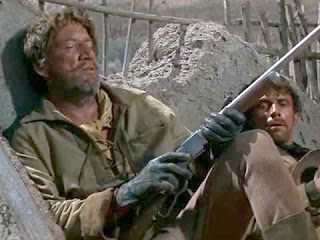Directed by Gordon Douglas; produced by David Weisbart
Two years after the American Civil War, former Confederate Army officer Lassiter (Richard Boone) lives only for killing Apaches, in revenge of their murder of his wife and child. Half-coerced and half-persuaded, he agrees to join a U.S. Army captain, Haven (Stuart Whitman), and his sergeant, Franklyn (Jim Brown), in tracking down a shipment of repeating-rifles that were stolen. After being joined by a flippant Mexican criminal (Tony Franciosa), the party follows a trail of Indian attacks intended to steal gold rather than kill, hoping to be led to a mysterious arms-dealer.
Rio Conchos, despite its late date, is rather a throw-back in many ways to earlier westerns, though it has elements of later films. It has plenty of action and some good gun-battles, with the violence seeming stronger than in many of its predecessors.
The direction is adequate – especially in the action sequences – while the acting is good. By this time, Boone could handle this sort of film without trying, and Franciosa probably had fun with his part. Whitman doesn’t really stretch himself and Brown, at the start of his acting career, isn’t given much to do.
The first half of Rio Conchos, however, is quite a bit superior to the second. This fact may have to do with the characters involved. Lassiter is a very bitter man, who nonetheless has not lost his sense of honour. His brief interaction with the colonel who recruits him shows that the two men respect each other, even if it is not stated.
Haven is an angry young man very much at odds with Lassiter, for reasons of his own. The Mexican, Rodriguez, appears a happy-go-lucky ne’er-do-well, who also has a separate agenda. These three play well off each other and their motives and goals keep the viewer guessing.
However, by the last reel, the dynamics have changed. The pointless death of one character and the loss of the others’ freedom reduce the entertainment of the story. The villain (Edmond O’Brien) has a scheme that seems both fantastical and vague, while the climax is strangely inconclusive in a number of ways.
Indeed, the difference in quality between the halves comes from the emphasis laid in the two parts. The first is about character, and relationships; the second switches to plot, which is not strong. Action overwhelms the individuals. This is not inevitable; in many other films, character and story go hand-in-hand. And perhaps they would have in Rio Conchos, too, if the script had been better.
The writer didn’t know, or didn’t care, that the U.S. Army was segregated in 1867; Franklyn appears to be a soldier among white comrades, whereas in reality, he would have served in a black regiment, with white officers. Adding to this historical incongruity, there are almost no references to Franklyn’s race. This would not normally bother me; there is no reason why race need be an issue – so long as the irrelevance isn’t out of place. Yet twice Franklyn is referred to as ‘the black’, in situations when a much more offensive word would likely have been used. It’s strange that in 1964 a film would have been so tame in this matter, when earlier pictures were more explicit.
While undemanding, Rio Conchos probably won’t satisfy the discriminating western fan, who may be left yearning for something more successfully crafted.









No comments:
Post a Comment